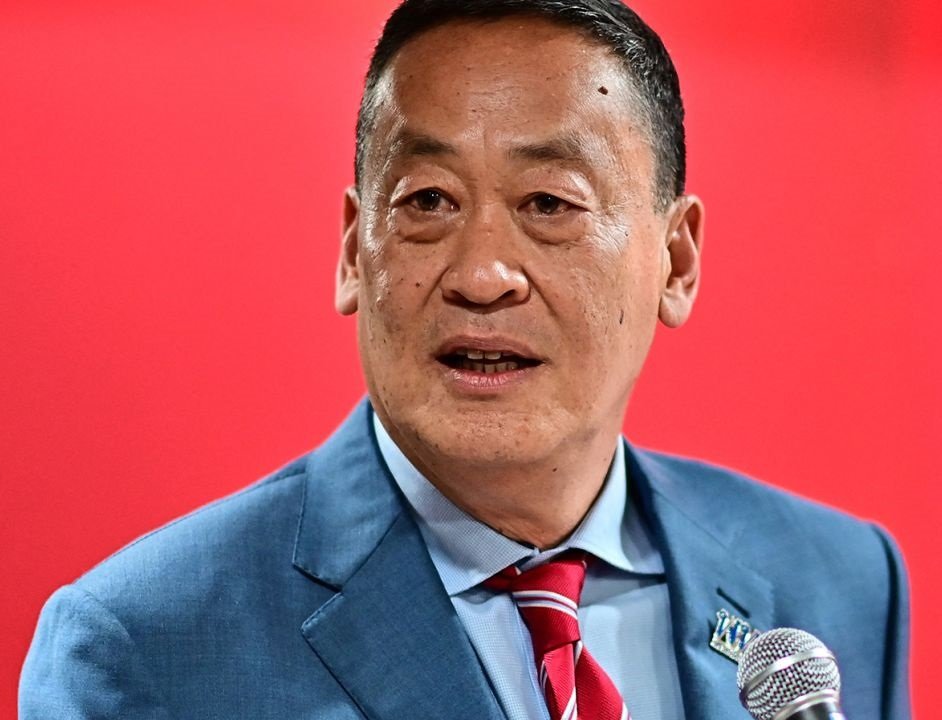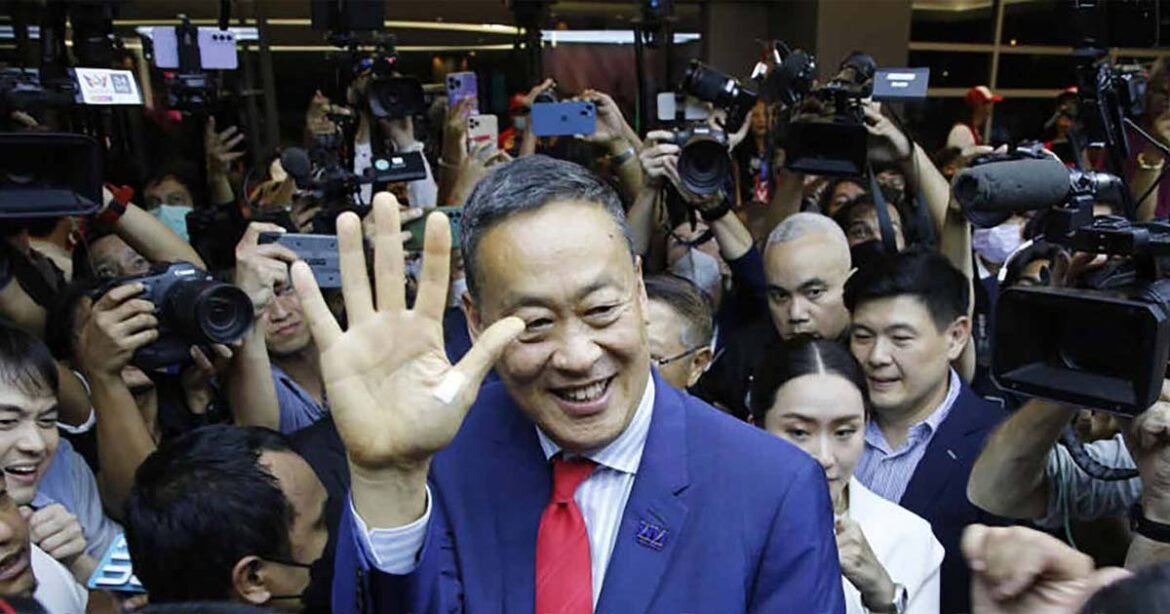The return of former Prime Minister Thaksin Shinawatra adds another layer of complexity, hinting at potential power dynamics and the possibility of renewed political negotiations.
Following a period of three months filled with uncertainty, the Thai parliament has designated Srettha Thavisin as the upcoming prime minister of the nation. Aged 61, Srettha, renowned as a prominent figure in the real estate sector, is viewed as a fitting choice for both the monarchy and the Senate, which is appointed by the military.
Yet, his recent election wasn’t the only significant event to unfold. Thaksin Shinawatra, the former prime minister who had been forcefully removed from power and had lived in exile since 2006, has returned to Thailand. Subsequently, he has been apprehended due to a prior prison sentence. Experts suggest that Thaksin’s decision to come back to Thailand showcases his confidence in his close ally, Srettha. Speculation is rife that Thaksin might have struck a deal to curtail his prison term in exchange for maintaining the dominance of the military and the conservative establishment.
You can also read: Myanmar crisis: Does Thailand’s talks with junta undermine ASEAN’s consensus?
Shift of political landscape
Srettha, an influential figure in the real estate industry, ventured into the realm of Thai politics only a few months ago, during the rule of Phew Thai. To secure his position as the next prime minister and to shape the upcoming government in Bangkok, he needed 375 votes. Remarkably, he garnered 482 votes, as indicated in a Facebook post by his team on Tuesday.
Thailand’s parliament has been in a state of uncertainty, governed by an interim administration since March.
The incoming prime minister now confronts the formidable task of revitalizing Thailand after nearly a decade of military governance, and reenergizing its economy. The country’s GDP growth in the second quarter stood at 1.8%, a figure reported by the National Economic and Social Development Council. This falls short of the 3.1% expansion anticipated by a Reuters poll.
The Move Forward Party achieved a historic victory in the May elections. However, their leader, Peeta Limjaroenrat, who was educated in the United States and holds liberal views, fell short of the required 51-vote majority to secure the top post in Thailand’s bicameral National Assembly. Notably, the Move Forward Party’s electoral triumph paved the way for a departure from the military-backed regime led by Prayuth Chan-ocha, who assumed power through a coup in 2014. Initially aligned with the Move Forward Party, Pheu Thai later pursued its own bid for authority.
On Monday, Thailand’s second-largest party, Pheu Thai, announced the formation of an 11-party coalition that secured 314 votes to establish a government, as per a Facebook post translated via Google. Controversially, this coalition included the pro-military parties of Ruam Thai Sang Chart — recognized as the United Thai Nation Party and linked to Prayuth Chan-ocha — as well as Deputy Prime Minister Prawit Ongsuwan’s Palang Prachath Party.
Srettha’s triumph materialized mere hours after Thaksin Shinawatra, the fugitive former prime minister aged 74, returned to Thailand for the first time since 2008. This marked the end of his 15-year self-imposed exile, prompted by being convicted in absentia for abusing power. He is presently serving an eight-year prison sentence. It’s worth noting that Thaksin was instrumental in the early incarnation of Pheu Thai.
“It’s possibly more than mere coincidence that Thaksin’s return aligns with the ascent of a sympathetic government to power. Thaksin might now seek a pardon, but this isn’t something the Pheu Thai government can achieve independently,” remarked political analyst Ken Mathis Lohatepanot. He further pointed out that the 11-party coalition could endure for the moment, united by their shared interest in transitioning into governance.
“However, there might be areas of policy disagreement; for instance, the leader of the conservative United Thai Nation Party has vowed to rectify what they perceive as ‘past mistakes,'” he added.
Srettha Thavisin: Transitioning from Business Tycoon to Prime Minister
Born in Bangkok and educated in the United States, Srettha commenced his career at Procter & Gamble Thailand until 1990, at which point he assumed the presidency of Sunsiri, a real estate developer established by his maternal family. A dedicated admirer of the English soccer club Liverpool, Srettha shares glimpses of his life, including images of his dog, on social media. Impressively towering over his peers, he stands at six feet and three inches (1.92 meters) tall.
His trajectory from the business realm to the role of prime minister parallels that of Thaksin, who amassed his wealth in telecommunications prior to his transformation into a “CEO Prime Minister.”
The military displaced Thaksin in a coup back in 2006, and later in 2014, a government led by his sister Yingluck Shinawatra faced a similar fate. For Srettha, his status as a newcomer to politics presents both advantages and potential drawbacks, according to analysts and those familiar with him. A colleague from his political party and two associates from his business circle depict Srettha as a straightforward communicator who doesn’t shy away from expressing his opinions.
“He never really assimilated into the role of a politician,” noted one of his business associates. “Many politicians find his demeanor uncomfortable, as they are concerned they cannot easily manage or influence him.”

While he might be unburdened by prior political entanglements, Srettha lacks a well-established political support base within his party and the broader public. This raises the question of how much autonomy Sretha can truly exercise, particularly with Thaksin’s return from self-imposed exile and his renewed presence in the political arena.
“Srettha remains an outsider in the political realm,” observes Ttipol Fakdewanich, the dean of Ubon Ratchathani University’s political science faculty. “His business ties and experiences could certainly shape his governance style and economic policies, but the extent to which he is completely independent from Thaksin remains uncertain.”
What Lies Ahead
Even with the current political impasse potentially finding a resolution, Srettha encounters the immense task of fulfilling the expectations of a voter base that sought change and now holds disillusionment towards his party – an entity that formerly rallied against the military but currently collaborates with it. Navigating the ongoing tensions, which could extend over months or even years, will be a considerable challenge.
Tasks Ahead in the Upcoming Days:
- Political impasse resolution possibility
- Fulfilling voter base expectations for change
- Disillusionment towards Sretha’s party
- Shift from anti-military stance to collaboration
- Navigating ongoing tensions
- Extended period of challenge ahead
In conclusion, the recent developments in Thailand’s political scene have brought significant shifts and challenges to the forefront. Srettha Thavisin’s designation as the upcoming prime minister reflects not only his political rise from the business sphere but also the intricate web of alliances and historical influences at play. The return of former Prime Minister Thaksin Shinawatra adds another layer of complexity, hinting at potential power dynamics and the possibility of renewed political negotiations. As Thailand navigates these changes, the nation’s political trajectory will be shaped by the interplay between new leadership, established powers, and the expectations of a population yearning for progress.


